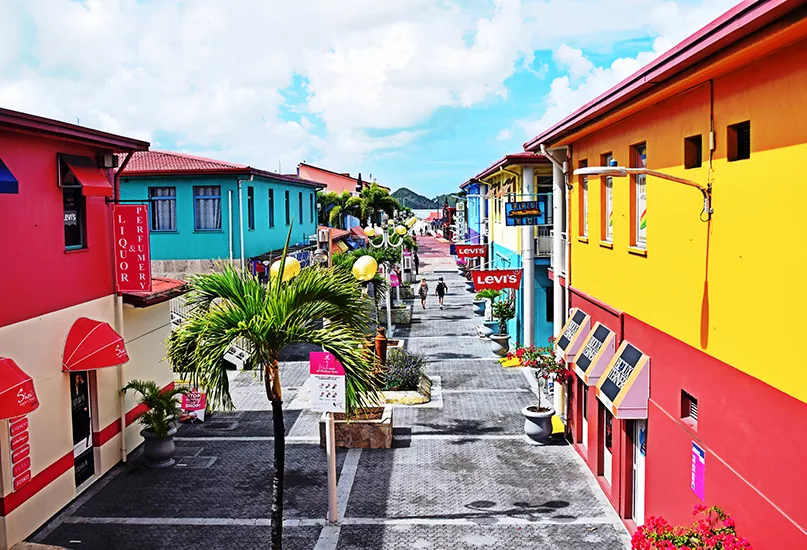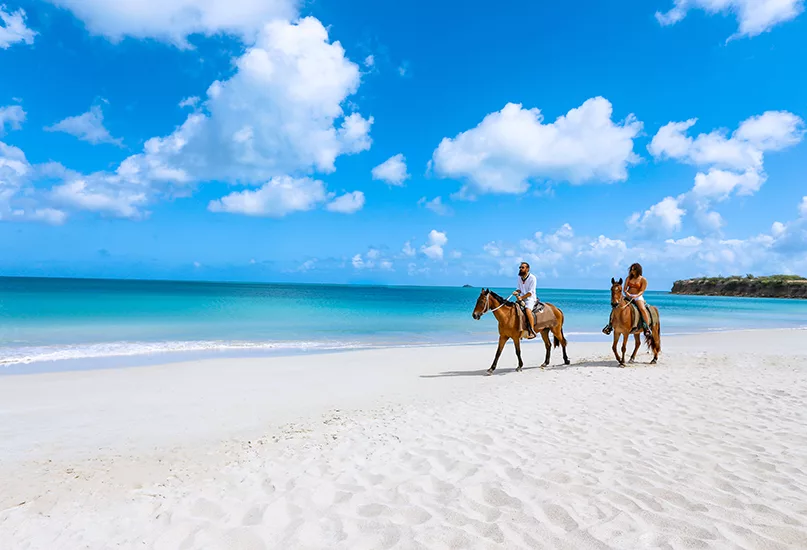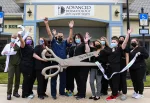As the perfect place for sun, sea, and sand, we take a look at how Antigua and Barbuda is expanding its business landscape to become the ideal investment destination.
SPOTLIGHT ON INVESTMENT IN ANTIGUA AND BARBUDA
As an idyllic duo of islands at the intersection of the Atlantic Ocean and the Caribbean, Antigua and Barbuda is most well-known for its tantalizing beaches, tropical climate and mangroves, and warm, welcoming hospitality.
Yet, the country’s business enterprise and plentiful investment opportunities are often overlooked.
Providing a picturesque backdrop, Antigua and Barbuda is an exemplary nation to both live and work in. The vibrant country takes pride in the quality of life it can offer whilst heralding a range of flourishing industries.
Antigua and Barbuda has historically been a hotspot for trade and commerce, particularly in the cultivation of sugar and cotton.
Today, the country’s tourism and related services, and construction industries are its biggest contributors to economic activity. Regarding the latter, the influx of tourists that the islands experience every year accounts for approximately 50 percent of Antigua and Barbuda’s GDP, whilst the critical mission of food security and self-sufficiency continues to drive the domestic agricultural sector.
Antigua and Barbuda is a proud member of the Organization of Eastern Caribbean States (OECS), and with a strong financial currency, the country has many attributes that make it ripe for investment. For starters, it has no foreign exchange controls and provides generous financial incentives for business owners.
Furthermore, the government of Antigua and Barbuda recently launched its Citizenship by Investment Program (CIP) for any internationals wishing to set up shop in the country. Those interested can obtain a passport and full citizenship by donating money to charity or purchasing considerable real estate, making it a very lucrative opportunity.
Going forward, Antigua and Barbuda strives to delve deeper into the technological advancement of its ICT infrastructure as an important enabler of its economic development. So far, the nation has experienced an evolution in its digital footprint due to increased amounts of private and public spending, but hopes to cement itself as a key contender for international financial investment alongside its burgeoning tourism sector.
Q&A WITH GARFIELD JOSEPH, EXECUTIVE DIRECTOR, ANTIGUA AND BARBUDA INVESTMENT AUTHORITY
Garfield Joseph, Executive Director, enlightens us on the work of Antigua and Barbuda Investment Authority in cultivating the optimum business environment for potential investors with a plethora of enticing incentives
As a governmental department, Antigua and Barbuda Investment Authority (ABIA) provides a vast range of investment promotion and facilitation services to help investors realize their full potential when placing their business in the country. This includes technical support and guidance for small to medium-sized enterprises (SMEs), as well as aiding with any logistical or administrative pressures.
The authority is also focused on the recognition and development of local entrepreneurs by facilitating the correct conditions for domestic businesses to flourish, whilst also extending practical training and business advisory services.
Additionally, ABIA liaises with the national government to foster the ultimate business environment with the goal of increasing the international reputation of Antigua and Barbuda.

Firstly, could you talk us through the origins of ABIA and provide an insight into the organization’s initial vision?
Garfield Joseph, Executive Director (GJ): The legislation establishing ABIA was formed in 2006, with the founding principles to facilitate investment flow into Antigua and Barbuda via both international and local partners.
In addition to having these two main strategic pillars, our vision involves providing support and training for businesses to make it easier and faster for them to invest, resulting in the growth and economic development of Antigua and Barbuda.
We are currently located in the financial center of the country, which allows us to efficiently provide investment facilitation, business enterprise support and development, as well as homeowner initiatives that are part of a wider program known as the Construct Antigua and Barbuda Initiative (CAB-I).
What does ABIA offer potential investors who are considering relocating their business?
GJ: There are several reasons why people should consider investing in the country.
For one, Antigua and Barbuda is strategically located in the Eastern Caribbean. This means that it’s easy to travel and trade with North America, as the closest point to the country is only a three-and-a-half hour flight away. We also trade with and travel to other places like Europe, with many international flights landing in Antigua and Barbuda every day.
The government of Antigua and Barbuda has invested heavily in the infrastructure that continues to drive business. For example, we have good telecommunication systems and a first-rate port; as a result, we have the best infrastructure for flights and the shipment of goods in and out of the islands’ ports.
Furthermore, we are a very safe country with one of the lowest crime rates in the entire Eastern Caribbean. Therefore, it’s not only a great place to do business, but a wonderful place to live as a collection of small islands with very friendly people and an extremely safe environment.
Our legislation also has generous concessions for investment, such as duty-free exemptions and tax waivers, which are also applied to international companies investing in Antigua and Barbuda. The key point here is that these incentives are in legislation, so it’s not dependent upon one particular administration’s policy and points towards substantiality.
Another aspect that I think is great is that we have a stable currency in the Eastern Caribbean dollar (EC$). Pegged against the US dollar, it has not fluctuated in over 50 years, so we have good economic growth. In fact, Antigua and Barbuda has had the third-largest growing economy in the whole of Latin America and the Caribbean over the last decade.
We also have an intelligent and diverse workforce that comprises people from across the region which provides us with a multicultural advantage. It’s a great place to do business and has a good quality of life; it’s safe, hospitable, friendly, and has a strong economy and judicial system.
What current investments are the authority conducting to help entice and support businesses?
GJ: Amongst a multitude of sectors, the country’s tourism industry continues to be a main focus in Antigua and Barbuda. We have the EC$2 billion Peace, Love, and Happiness (PLH) project ongoing in the latter, alongside a number of high-end resorts in the former.
The government of Antigua and Barbuda has also recently invested in our deepwater ports to boost the logistics sector, as well as investing in the orange and blue economy with the hope of prioritizing the latter. We want to take advantage of our 200 miles of (oceanfront) exclusive economic zone by utilizing the fish and renewable energy opportunities that our coastal line affords us.
We also want to prioritize investment in tourism, services, renewable energy, education, and healthcare. For example, we have a stem cell research center that is gaining traction. We want to combine healthcare and tourism services in order to create a unique positioning for Antigua and Barbuda.
Could you tell us how the organization is looking to expand investment in the country’s yachting sector?
GJ: Nelson’s Dockyard in Antigua is a UNESCO World Heritage Site and one of the safest harbors in the Caribbean. As a highly secure and efficient port, a lot of ships visit every year, even in the winter and hurricane seasons. Therefore, we are pursuing these opportunities to diversify and grow our economy.
Moreover, Antigua Sailing Week occurs every April and stands as the fourth largest regatta in the world, with no sign of stopping. Not only can we provide a place where visitors can enjoy the sun and the sea, but we can also service yachts during the off-season, such as repairs and maintenance support.
ABIA also wishes to explore the possibility of working on renewable energy sources within the yachting sector. We are in dialogue with several companies who wish to explore hydrogen as an energy option for large vessels that are currently burning fossil fuels, and Antigua and Barbuda is the ideal place for that.

Similarly, how is ABIA encouraging the further development of the country’s agricultural industry?
GJ: The agricultural industry in the country is greatly affected by our geographical location, as we do not experience large amounts of rainfall, which presents a serious challenge. The upside is that we have an abundance of sun, sea, and sand; the curse, metaphorically speaking, is the limited amount of rainwater every year. However, thanks to the advancement in science and technology, we are pursuing non-traditional farming methods to achieve higher yields, even out of season, by focusing on particular crops and egg farming in poultry production.
We also see this as an opportunity for import substitution. In a population of approximately 100,000, we import as much as EC$100 million in poultry every year, so we have a captive domestic market in terms of levels of consumption. Conversely, while we may not be able to leverage economies of scale, our agricultural sector remains a key growth area for food security. With the right import substitution of approximately 30 to 40 percent, alongside our own produce, we can become more self-sufficient despite the disruptions caused by our climatic conditions, related barriers, and challenges.
What makes Antigua and Barbuda the best location for business process outsourcing (BPO), and what benefits can be drawn for companies choosing to partner with ABIA?
GJ: There are a number of reasons why Antigua and Barbuda is the best place for BPO, due to our distinctive capabilities enabling environment and long tradition of innovation and breaking ground in new industries.
Historically, we were one of the first countries in the Caribbean to offer offshore gaming. Although we don’t have many players now, we pioneered this industry outside the US. Additionally, we are home to key figures who are making major progress in stem cell research. The country is able to offer the best treatment thanks to world-leading doctors who have moved offshore to the islands to conduct business.
The foregoing illustrates how we are forward-thinking and open our arms widely to organizations that choose to do business here. We provide the infrastructure, support, and incentives they require in a safe environment.
On top of this, we are distinctive in our offering of services and incentives for taxes, as well as a multitude of concessions for equipment, machinery, and supplies, dependent on the level of investment. This makes it a great place to live, work, and do business.
How can both ABIA and international business operators benefit from investment in Antigua and Barbuda?
GJ: We are always outward-looking because we recognize that as a small developing country, we have limited resources for the critical infrastructure found in more developed countries.
However, an advantage of our small size is that for some industries that are capital-intensive, we lack economies of scale. At the same time, we have many unique opportunities with relatively low capital investment requirements and good opportunities for rapid payback on invested capital because the market is less competitive than in other countries, whilst the amount required to start a new business is significantly higher.
There are many such international investors that have seized these opportunities across a range of sectors.
We are also proud of our multicultural society and diverse workforce as the islands comprise people from neighboring countries such as Guyana, Jamaica, Dominica, and the Dominican Republic. However, we are one of the few Caribbean nations with an open immigration policy and strong banking and legal systems.
So, we want our international investment partners to take a first look at Antigua and Barbuda as a great place to invest and live.

As part of the Antigua and Barbuda government, how does ABIA encourage local prosperity?
GJ: The government of Antigua and Barbuda is heavily focused on creating opportunities for all. The number of social programs offered by this government is rare for a small developing country. For example, it has invested heavily in education at every level, created low-cost funding to drive business growth and entrepreneurship, and invested heavily in subsidized housing and the health care system. The government has also supported the development of IT, the international airport, and deep-water ports. These types of investments are the key drivers of economic growth and prosperity, and we believe we are on the right path. The growth of the economy over the last decade and a half and the per capita growth income are a testimony to this.
As far as ABIA is concerned, we are heavily focused on making it easier, faster, and cheaper to invest in Antigua and Barbuda. We are also heavily focused on providing training and other support services to ensure businesses can compete locally and internationally.
Finally, what are the future goals and priorities of ABIA, and what strategies will you employ to facilitate and implement them?
GJ: We have many strategic priorities at ABIA to invite international investment into Antigua and Barbuda, with greater returns in the long run. We want to be able to continue to provide ongoing business support by listening and responding to the voice of the customer.
The other priority for us is to continue to invest in our people to ensure we have the best staff in terms of attitude, knowledge, and skill. We are also seeking to empower women to play a greater role in the economy.
In summary, as a small developing country, we have many goals and objectives. Foremost on our minds is to make Antigua and Barbuda a great place to live, work, and do business. Secondly, we want to build the strongest, most resilient, and sustainable economy in all of the Caribbean, and finally, we want to create economic and social mobility for all.

































